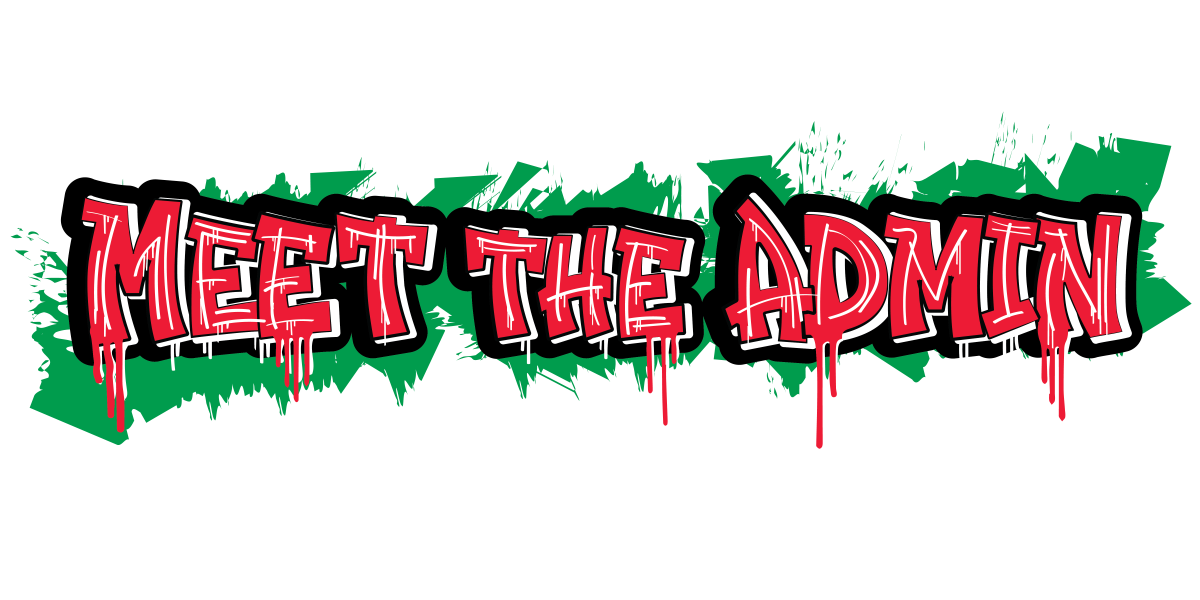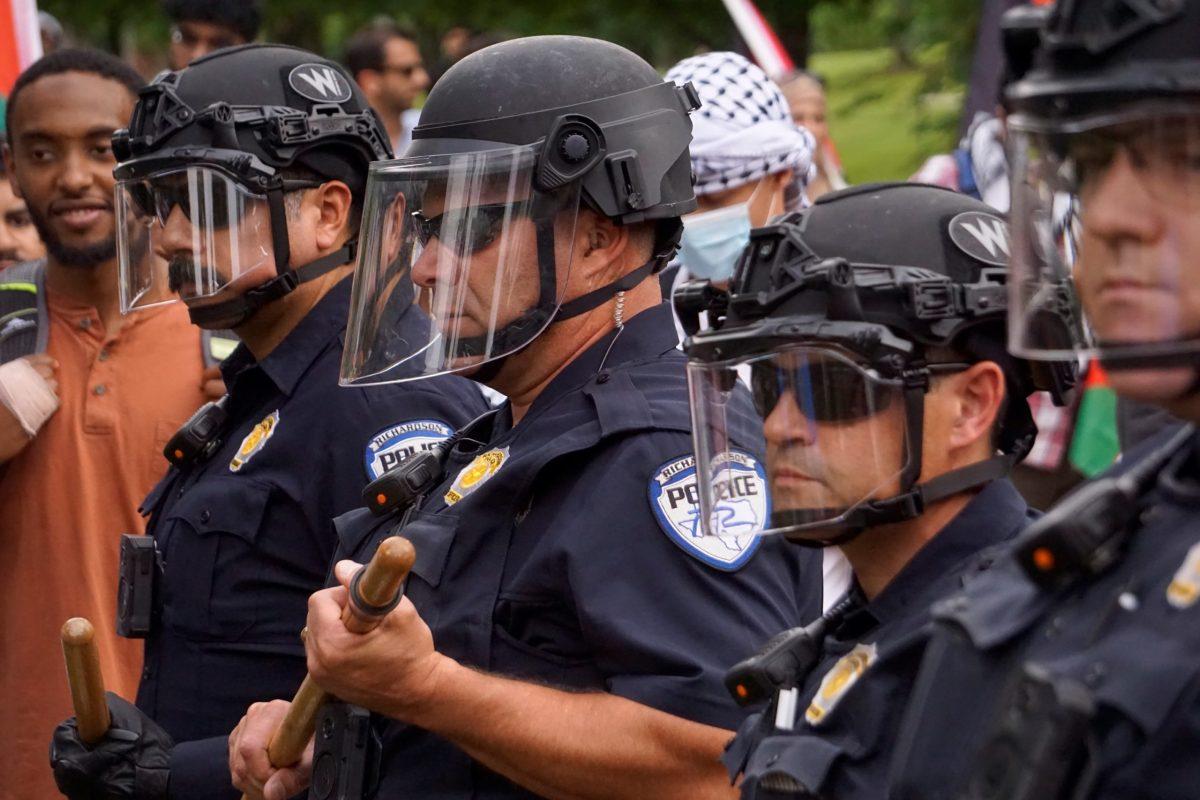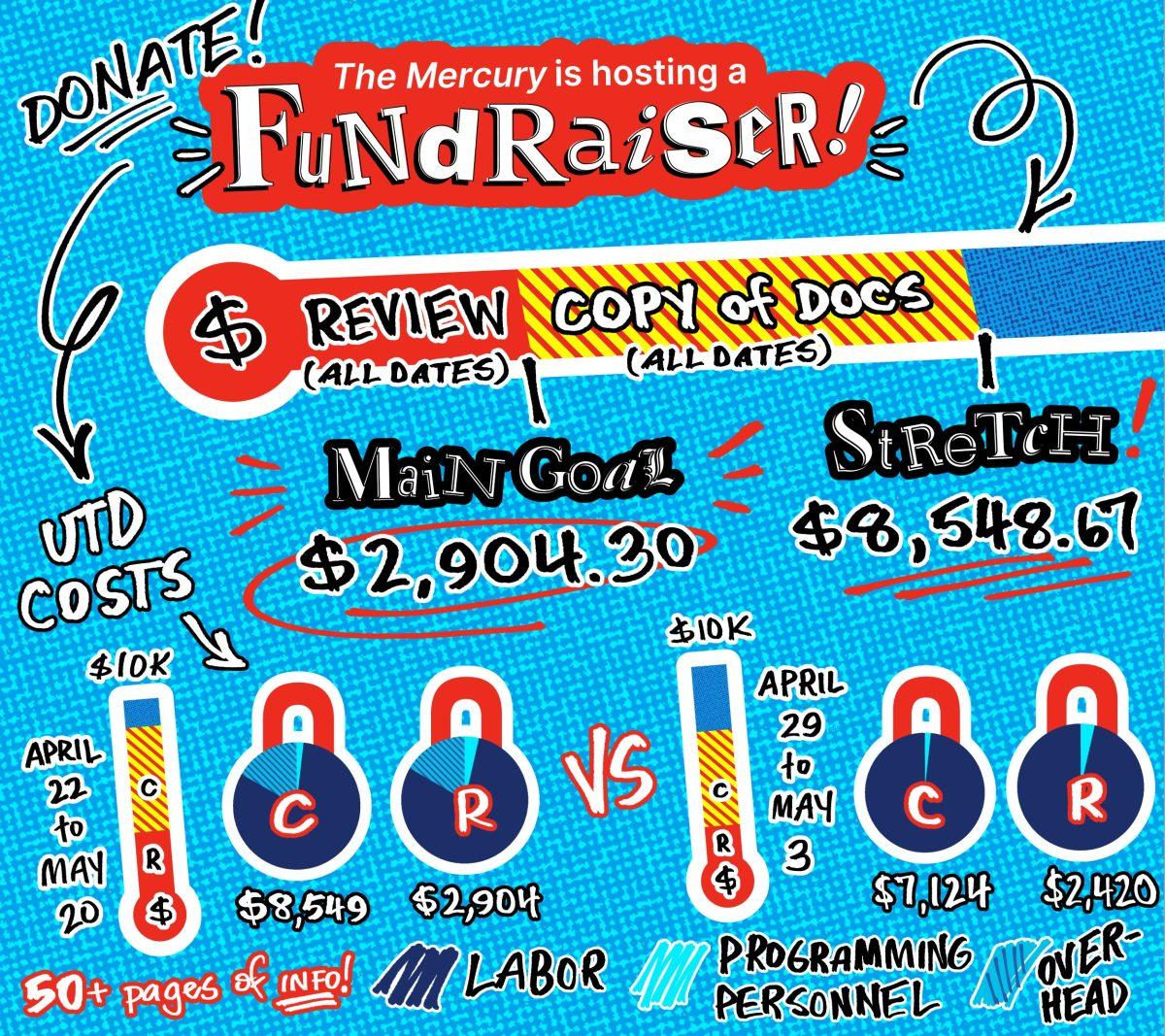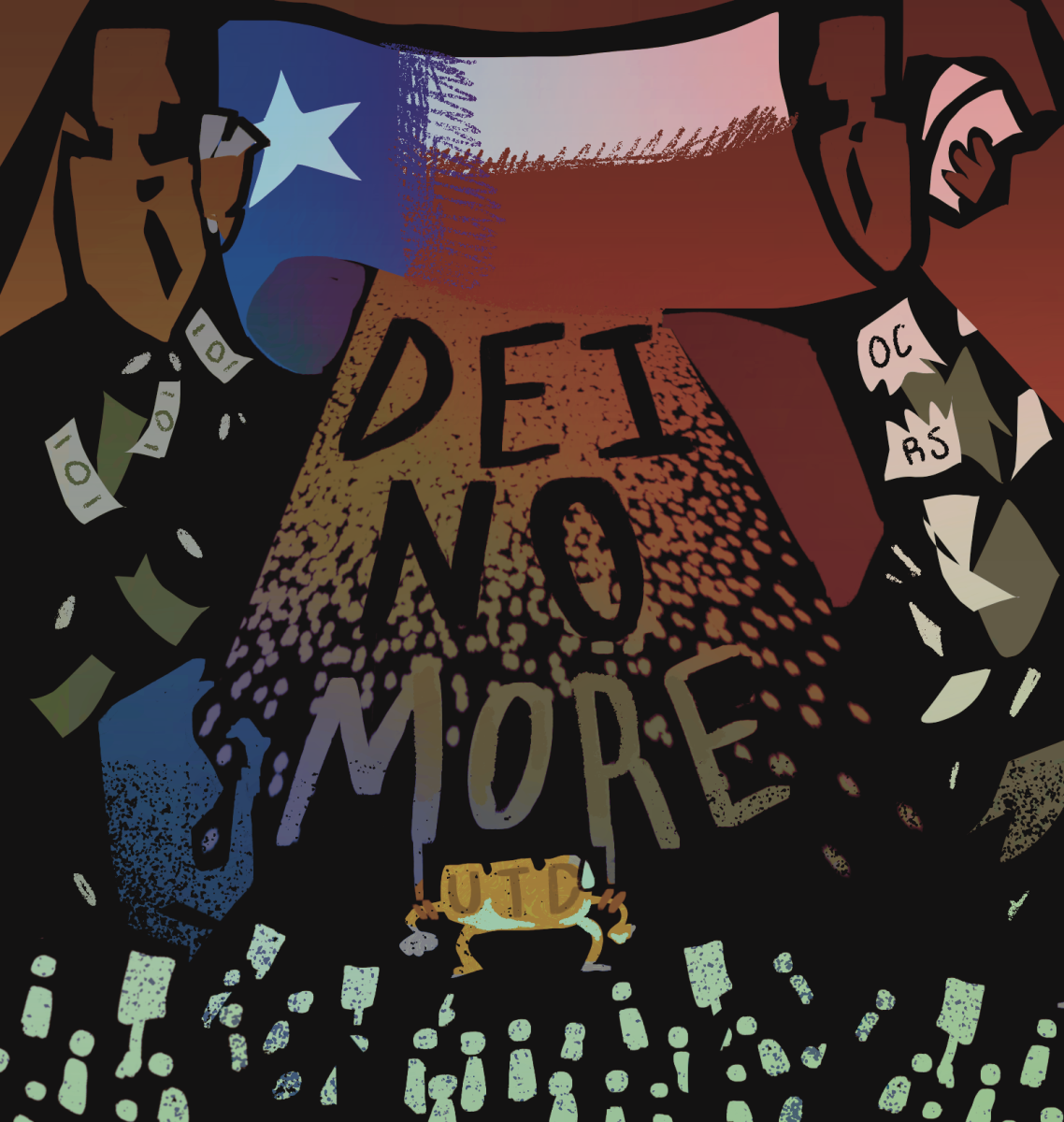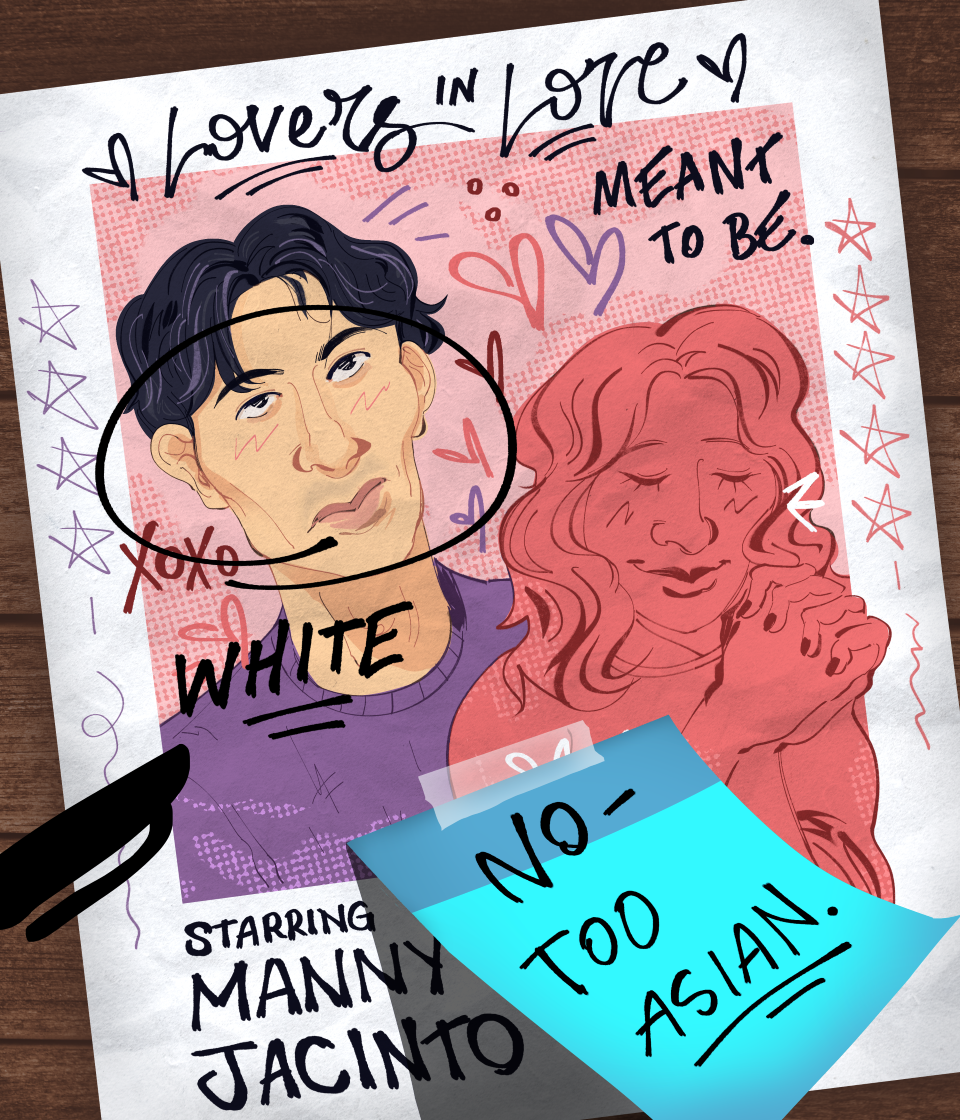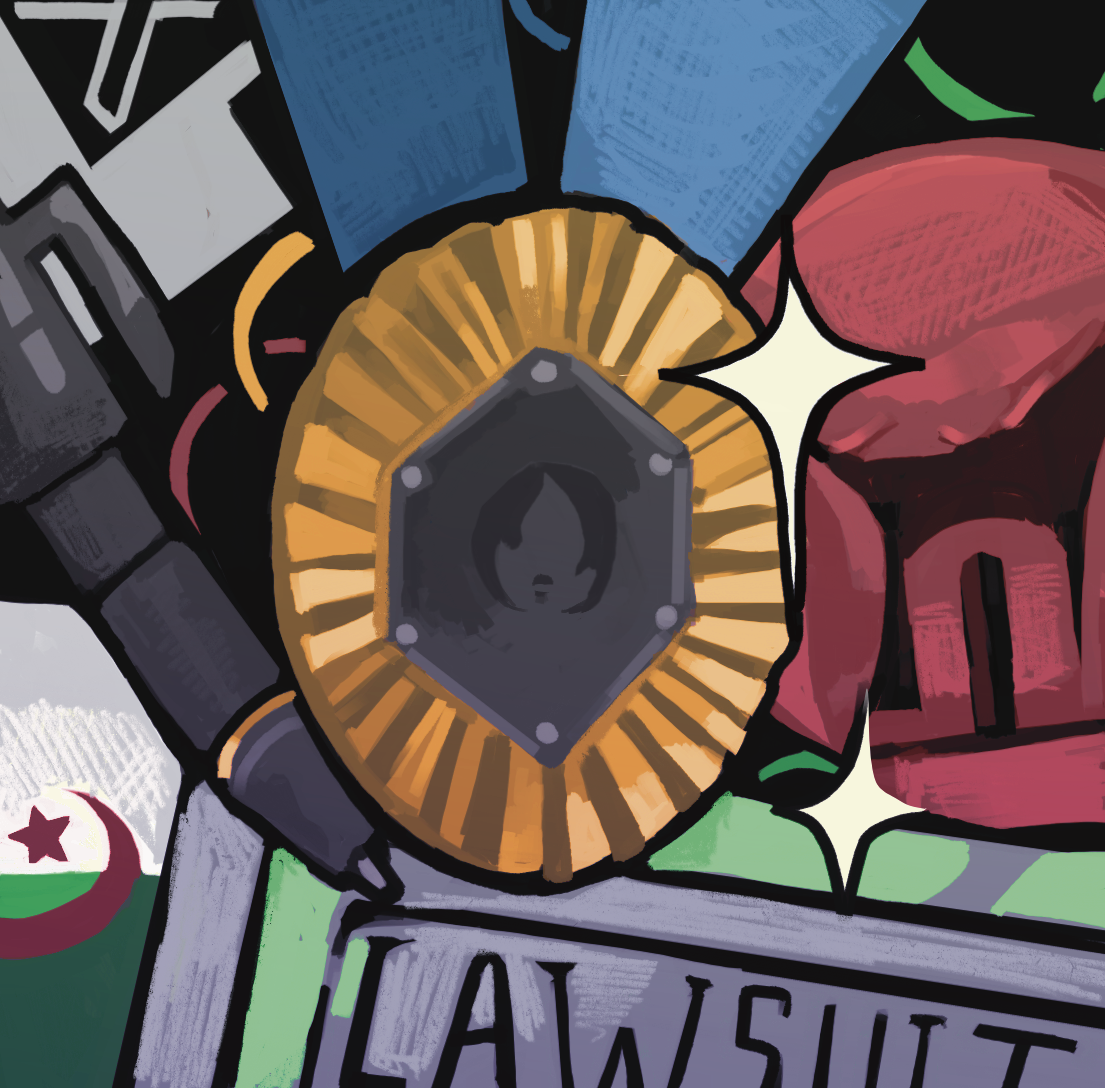State troopers slammed our own students and faculty into the ground, aiming to destroy not just their encampment but their spirit. The administration’s response to the “Gaza Liberation Plaza” on May 1 normalizes military-grade violence against student expression, leaving a bloody specter over all future student protests and expressions on UTD’s campus.
Students arrested, administration well-rested
Students sat in circles at Chess Plaza, studying and eating food brought by volunteers. They talked about poetry and politics with faculty that joined the encampment in solidarity and provided reading materials. A community library was available to anyone who wanted to learn about social and political issues, with particular emphasis on Palestinian literature. Protesters called for UTD to divest from Israel and for the liberation of Palestine.
The atmosphere of the encampment was amicable, academic and peaceful. Students were not a threat to campus safety. UTD administration had no reason to deploy state troopers, police drones, assault rifles, snipers or grenade launchers.
A total of 21 people were arrested, including three faculty, one alum and nine students. Law enforcement’s approach to the arrests was excessive. Instead of a typical arrest through handcuffing wrists, officers bound the arrested at the waist and ankles as well as their wrists. These arrests were indiscriminate, including not only encampment protesters but those standing between the police and the encampment — including Assistant Professor of Art History Ali Alibhai, who was not attending the protest but had rushed to stand up for students by asking why officers were present with excessive force. Did Alibhai deserve to be kicked and knocked to the ground before being tossed into a hot car for half an hour? Is this a testament to how much UTD’s administration cares about its faculty?
A group of protesters tried to stand their ground by locking arms and sitting in a circle inside the encampment as they watched officers tear it apart. No protesters tried to pick a fight with an officer; instead, they verbally coordinated with each other to move out of the way of police as they forced their way through Chess Plaza and the surrounding area. Even after their encampment was destroyed and as they sat overnight at Collin County Jail, protesters continued to be peaceful.
Nonsense Notice
To: Protesters
From: Administration
Protesters read a letter from UTD around 3:45 p.m. that cited a vague violation of university policy. Fifteen minutes after the notice was read, officers moved in to destroy the encampment — giving students no time to evacuate or react. The letter fundamentally failed to clarify what rules had been broken, with the only takeaway for students being that administration would have them arrested for criminal trespass if they did not remove the encampment immediately.
Administration has made it clear they believe students and faculty deserve such treatment. UTD President Richard Benson said in his op-ed for The Dallas Morning News that “[the encampment] was a well-planned, intentionally provocative operation.” Instead of honoring students’ right to protest, he assumed the worst of the protesters despite having no evidence of any risk they posed, and the militarized response he authorized treated students and staff as subhuman.
UTD knew about the encampment since at least 6 a.m. when Vice President and Chief of Staff Rafael Martín told protesters to disband — verbally, not in writing. Communications were scant for the rest of the day. Instead of attempting to de-escalate the situation, Benson let protesters face brutality at the hands of law enforcement while he had a clandestine rendezvous with Harlan Crow, renowned for his room dedicated to Nazi memorabilia. Administration did not communicate with students again until around 3 p.m. when the written notice was sent. Several hours had passed between communications, and a lack of hard details was a constant between both encounters. Benson and other members of administration have a responsibility to their faculty and students to issue several clear, accessible warnings and attempt actual dialogues with their students and faculty before even thinking of using police force.
UT System Board Chairman Kevin Eltife said the UT System made the decision to bring in outside law enforcement, like the state troopers, to destroy the encampment. Eltife feels no remorse for his decision to use excessive police force on a peaceful protest. In an interview with The Dallas Morning News, Eltife said he “applauded” state troopers’ dismantling of the encampment and that “we will do it again if needed.”
The UT System does not have a specific policy in place barring students from creating an encampment. The written notice read aloud at UTD’s encampment intentionally did not state which policies were violated so that Benson and the UT System could abuse their power by facilitating police vilence against its own students. The notice’s vagueness calls into question how — or even if — students can safely protest on campus again when such a threat of force now looms over them. The truth is, administration does not care about its own policies. The intensity of calling in state troopers to a peaceful protest completely goes against UTD’s Speech, Expression, and Assembly policy, UTDSP5001, in subsection 48, where it reads, “It is the responsibility of the University to make its best effort to protect the safety of all persons on campus and to provide police protection for speakers, public assemblies, persons staffing or viewing exhibits, and other events.”
Administration and their love affair with overcompliance
This isn’t the first time Benson has harshly cracked down on student expression. As Israel increased the severity of its attacks against the Palestinian people after Oct. 7, students took to the Spirit Rocks to show support for Palestine or Israel. The Spirit Rocks, which were an integral facet of freedom of expression at UTD, were removed during Thanksgiving break. Again, there was no violence incited by the back-and-forth of students’ support for Israel or Palestine. Despite paying lip service to students’ civility, administration decided to remove one of the few things that brought students together and gave UTD life — just because it didn’t want to platform empathetic sentiments for Palestine.
After arrested students and faculty were released, their bond conditions severely restricted their presence on campus during the incredibly busy time of finals and graduation. Those arrested can only set foot on campus for “essential” activities, such as teaching or attending classes. Assistant History Professor Ben Wright, one of those arrested, said his colleague Rosemary Admiral was only permitted access to her office with a UTDPD escort, far beyond what her release conditions require. Benson established that the encampment was nonviolent, and no weapons were found in it or on the arrested individuals, so the constant overcompliance is unnecessary and only serves to intimidate students and faculty.
UTD has a history of overcompliance. A perfectly law-abiding office that existed under SB 17 for nearly the entire spring semester, OCRS, was dissolved because of fearmongering from Sen. Brandon Creighton — further proving that students are the first to be sacrificed when administration gets nervous. There are a plethora of available options when interacting with a peaceful encampment protest, and even if administrators disagreed with the optics or beliefs platformed by the encampment, calling in Texas DPS and multiple police departments to forcefully subdue students should never have been a viable option.
How to divest: a guide for administration
Eltife said to The Dallas Morning News that divesting from companies that support Israel militarily was not an option because he wants to continue maximizing UT Systems’ investments, to ensure students have an affordable education. What Eltife fails to understand is there is no concrete indication that UTIMCO’s $1 million investment into Lockheed Martin, which amounts to only 0.002% of the total $69.2 billion in UT System investments, improves the quality or affordability of student education. The amount of money invested across all five divestment target companies pales in front of the total funds overseen by UTIMCO. UTD and the UT System divesting from the five corporations students protest against would be tantamount to a rounding error on an accounting sheet. And even if divestment would hurt UTD financially, it would still be necessary. The money of students pursuing an education in Texas is being funneled without our consent into weapons manufacturers that work tirelessly to end the educational prospects of countless children around the world, which is unconscionable.
Though the process of divestment is long — divestment from pro-apartheid companies in South Africa took roughly five years for many campuses — divestment, beyond just distancing academic institutions from oppression, is a statement of solidarity and a direct actionable goal campuses can take against apartheid regimes. When institutions such as Evergreen State College aim to divest from Israel, it is proof their administration cares about the concerns of students and is willing to amend university structures that don’t align with their campus community’s core values.
UTD administration, if your institutional goal is actually to be a “responsible global citizen that enthusiastically attends to our duty to create a sustainable environment,” you would listen to the demands of an overwhelming majority of your community, which has spoken through protests, Student Government resolutions, petitions and more. You would refrain from weaponizing excessive force against your own students and faculty, or at the very least, apologize for and condemn your actions and begin the divestment process. Those who cared for their students would not try to enshrine a precedent of blind aggression against student expression, which contradicts the personal beliefs of administration.
The Mercury officially recognizes Israel’s actions in the occupied territory of Palestine as a genocide in line with the interpretation put forth by humanitarian organizations like Amnesty International. The Mercury condemns UTD administration’s hostility and militarized response to student protests and demands that they immediately begin the process of repairing their relationship with the campus community. Peaceful protesters calling for an end to genocide and apartheid should never have been met with such extreme violence.

